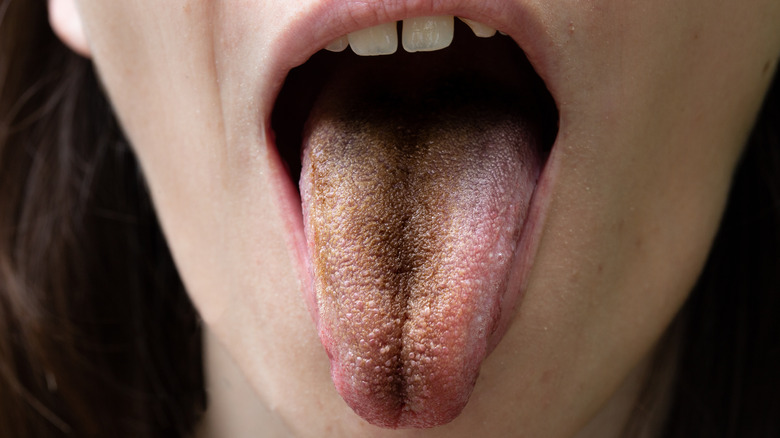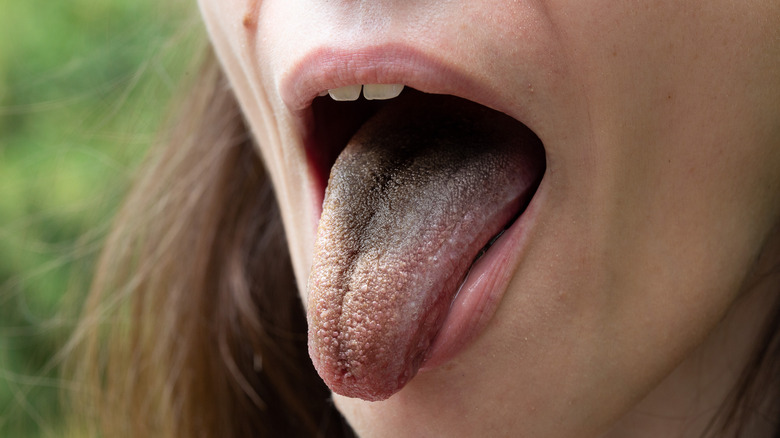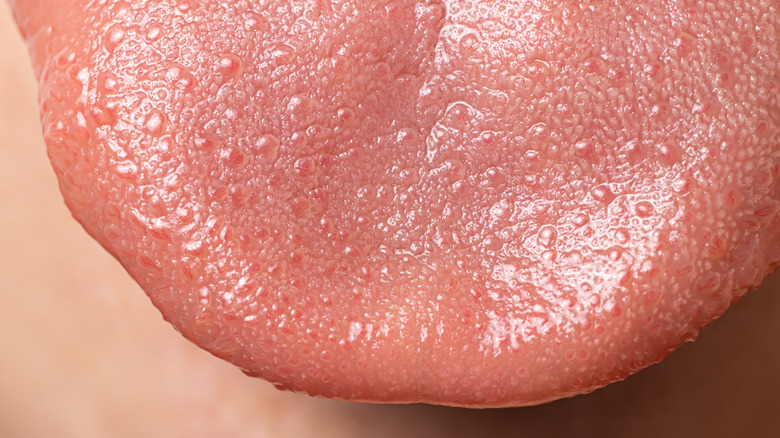What Is Black Hairy Tongue?
In early November 2022, bestselling "Julie and Julia" author Julie Powell died at the age of 49, as the Los Angeles Times reports. Powell's cause of death was cardiac arrest caused by an irregular heartbeat, or arrhythmia, according to her brother-in-law, Ethan Powell. Shortly before she died, Powell tweeted she experienced something she called black hairy tongue, an unusual — though very real — oral condition, according to Mayo Clinic. This is not some old-timey condition we read about in ancient books — it's something anyone can experience. Strangest of all, the symptoms of black hairy tongue, which is typically harmless, are just like they sound: a black or discolored area of the human tongue covered in a hair-like substance.
In the months leading up to her death, Powell also tweeted about her recovery from a COVID-19 infection. This led some who followed the writer to speculate that her black hairy tongue diagnosis and subsequent death could be related to the coronavirus (there is, however, no evidence that's the case, as Gizmodo notes. Nor is there any link between Powell's tongue or death and the COVID-19 vaccine, per Politifact.) As the Mayo Clinic goes on to explain, an exact cause of black hairy tongue is sometimes never found, but a number of issues are believed to contribute to the condition, none of which are viral in origin. Black hairy tongue, as WedMD writes, is most often caused by bacteria.
Papillae on the human tongue grow up to 15 times their normal size
As WebMD goes on to explain, black hairy tongue is a result of the papillae (those bumps on our tongues where our taste buds live) failing to shed from our tongue properly as the skin cells naturally die off, as WebMD elsewhere notes. As a result, the papillae then sometimes grow up to 15 times their normal size, with a hair-like look and texture. What we eat and drink as well as bacteria or even naturally-occurring yeast in our mouth then builds up on the enlarged papillae, causing the discolored appearance.
Patches of black hairy tongue are most often just what the condition's name implies: black, but those off-colored patches also sometimes show up in a number of other mildly-disturbing colors like brown, green, or yellow. In addition to a hair-like substance on the tongue creating an unsettling appearance, those who experience black hairy tongue often report a tickling sensation in their mouths, feelings of nausea, a burning sensation on their tongue, and in some extreme cases, a worsened gag reflex. Black hairy tongue can also sometimes affect our sense of taste, as Mayo Clinic explains.
Antibiotics sometimes cause black hairy tongue
Black hairy tongue is most often harmless and with simple oral hygiene treatment, the condition will resolve on its own. According to the Mayo Clinic , one cause of black hairy tongue can sometimes be antibiotic use, as that treatment upsets the natural bacteria balance in our bodies. Poor oral hygiene and excessive alcohol, tobacco, and caffeine intake can also sometimes cause the problem. Certain types of mouthwashes are known to contribute to the condition, as are diets heavy in certain types of textured foods that fail to scrape off papillae naturally.
Based on January 2021 reporting from NBC News, some English scientists looked into so-called COVID tongue, with symptoms similar to black hairy tongue, which Powell tweeted was her diagnosis. Like black hairy tongue, in speculative cases of COVID tongue, which as of NBC News 2021 report was an unconfirmed symptom of COVID-19 infection, the tongue had a furry coating unable to be brushed away. Those patches were most often white or yellow, though, and COVID tongue was also painful, unlike black hairy tongue, which is most often painless, according to the Mayo Clinic.


